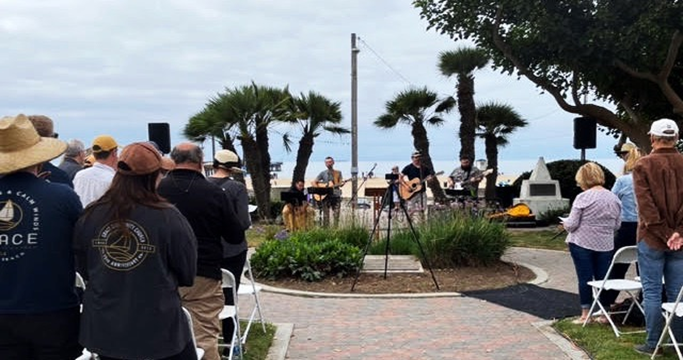
“A Piece of My Mind”
October 2023 Newsletter
Advancing Christian Faith and Values,
Defending Religious Liberty for All,
Supporting Civility and the Common Good
through Preaching, Teaching, Writing,
Activism and Reasoned Conversations

Religious Liberty Vigilance –
The Freedom to Hire
 “Those who expect to reap the blessings of freedom must…undergo the fatigue of supporting it.” – Thomas Paine
“Those who expect to reap the blessings of freedom must…undergo the fatigue of supporting it.” – Thomas Paine
“I consider the government of the United States as interdicted by the Constitution from inter meddling with religious institutions, their doctrines, discipline, or exercises.”
– Thomas Jefferson to Samuel Miller, 1808
Should Government Interfere with Hiring Decisions by Churches, Religious Schools and other Religious Institutions?
When will state and local governments realize they have no business interfering with a religious organization’s decisions about whom it hires?
Long ago (1987) the U.S. Supreme Court ruled unanimously (that’s 9-0!) that the Church of Jesus Christ of Latter-day Saints had the right to determine whom it would hire to work at a church-affiliated gymnasium program.
The plaintiffs, who had been refused membership in the LDS church, sued, arguing that “nonreligious jobs” (like working in a gym) should not be exempt from the Civil Rights Act of 1964 that protected employees. Furthermore, they argued that giving religious organizations an exemption from anti-discrimination requirements (as Section 702 of the Civil Rights Act did) amounted to unconstitutional favoritism toward religion.
“No!” said the Supreme Court emphatically. Churches are not forbidden from advancing their religion; only the government is forbidden to do so. Section 702 in the Civil Rights Act didn’t promote religion. It allowed religion to be free of government control.
[Section] 702 is rationally related to the legitimate purpose of alleviating significant governmental interference with the ability of religious organizations to define and carry out their religious missions… [Section] 702 does not impermissibly entangle church and state. Rather, it effects a more complete separation of the two.
(Corporation of the Presiding Bishop of the Church of Jesus Christ of Latter-Day Saints v. Amos)
Forward to 2017 – Assembly Bill 569, the “California Reproductive Health Non-Discrimination Act,” passed the state legislature.
While appearing to be a law that applies neutrally to all employers, its real targets were churches and other religious institutions—those that balk at the secular orthodoxy of “reproductive rights” for which contraception and abortion are holy sacraments.
That the bill targeted religion is seen from the examples cited in arguments listed for needing the bill. ALL the examples that supposedly identify the “problem” involve religious institutions.
If AB 569 had become law, religious organizations could no longer require a code of conduct on moral issues. Their employee handbooks would have to spell out what an employee’s “rights and remedies” are.
This bill clearly violated the “free exercise” of religion guaranteed in the First Amendment. Gov. Jerry Brown properly vetoed it.
Now along comes a decision by the Washington (State) Supreme Court applying a state law forbidding religious discrimination in hiring to the hiring practices of a religious organization that wants its employees to believe and live by its religious convictions.
The Yakima Union Gospel Mission, founded in 1936, shares the Gospel of Jesus Christ in words and in deeds, by providing care and solutions to homeless people. Now the court would force this mission and ministries like it to hire employees that don’t share its beliefs, and to penalize them if they refuse.
But true Religious Freedom allows individuals to believe as they choose and live accordingly, free from interference by government. Likewise, religious organizations must be able to do the same, without worry of government intervention. The Mission’s CEO, Mike Johnson, said, “Christian ministry is about pulling together a team for a life or death mission. Without forging this Christian mission, all we offer [are] services” which can be found elsewhere.
The Alliance Defending Freedom is right: “Religious organizations must be able to hire employees who share the beliefs of the organization. Otherwise, the organization’s entire purpose is undermined.”
I’m confident this court decision will not stand. Addressing cultural attitudes about the essence and depth of religion, however, is a more difficult matter.
Bible Insight –
The Good Samaritans of Poland (1944)
A lawyer stood up to put [Jesus] to the test, saying, “Teacher, what shall I do to inherit eternal life?” He said to him, “What is written in the Law? How do you read it?” He answered, “You shall love the Lord your God with all your heart and with all your soul and with all your strength and with all your mind, and your neighbor as yourself.” He said to him, “You have answered correctly; do this, and you will live.”
But he, desiring to justify himself, said to Jesus, “And who is my neighbor?”
Jesus replied, “A man was going down from Jerusalem to Jericho, and he fell among robbers, who stripped him and beat him and departed, leaving him half dead. Now by chance a priest was going down that road, and when he saw him he passed by on the other side. So likewise a Levite, when he came to the place and saw him, passed by on the other side.
But a Samaritan, as he journeyed, came to where he was, and when he saw him, he had compassion. He went to him and bound up his wounds, pouring on oil and wine. Then he set him on his own animal and brought him to an inn and took care of him. And the next day he took out two denarii [two day’s wages] and gave them to the innkeeper, saying, ‘Take care of him, and whatever more you spend, I will repay you when I come back.’
Which of these three, do you think, proved to be a neighbor to the man who fell among the robbers?” He said, “The one who showed him mercy.” And Jesus said to him, “You go, and do likewise.”
(Luke 10:25-37 English Standard Version)
In a Wall Street Journal op-ed (September 16) Nicholas Tomaino speaks of Józef and Wiktoria Ulmas of Markowa, Poland. During World War 2, Nazis were searching for the 120 Jews who lived in this town of 4,500.
The Ulmas welcomed into their home the Saul Goldman family of five plus three of their neighbors. Betrayed about a year later, all were rounded up in their home at 4:00 a.m. on March 24, 2044. The Ulmas (including seven children) and their guests were executed and the home was looted.
Recently 30,000 attended a Mass in Markowa to remember the martyrdom of the Ulmas as they were “beatified” by the Catholic Church.
Tomaino says, “The underlined parable [in the Ulmas’ family Bible] that inspired the Ulmas…captured the essence of the Christian mission.” In the story of The Good Samaritan, Jesus taught about loving our neighbor in clear and, if necessary, costly ways.
“Christ analogically describes himself; he sets an example and urges us to go and do likewise. The Ulmas scribbled in the margin their answer to the call: ‘yes’.”
THE MORALITY VIRUS
[To understand this “Letter to the Editor” you have to allow for SARCASM!]
A newspaper article on a possible flu pandemic said: “So far, human-to-human transmission is limited, but the strain has a 60 percent morality [sic!] rate.”
Whew! I’m glad this flu strand doesn’t have a 60 percent mortality rate! That would really be dangerous. Instead, this virus spreads morality. A 60 percent morality rate would be quite wonderful indeed!
Of course, there are vaccines we can get to protect us from the morality virus. A few shots of certain modern theologies will prevent moral infection, especially if the theology says the Bible’s moral teachings are culture-bound and limited. Or a vaccine might protect us by teaching that our social sciences give us moral insights superior to those of the biblical prophets and sages.
I for one would prefer we skip the vaccines and catch this flu!
– Donald P. Shoemaker, Long Beach Press-Telegram, n.d.
 Message of the Month:
Message of the Month:
Let’s Be “An Ordinary Church”
“The problem of . . . goes deeper than scandals surrounding a few celebrity pastors. The problem of . . . arises with the desire to be an extraordinary church led by extraordinary communicators and extraordinary musicians creating an extraordinary experience.
“When it comes to church, we don’t need to be entertained. We don’t need to be wowed. We need ordinary churches with ordinary people doing ordinary work in communion with an extraordinarily loving God.”
(Ministry Watch, June 5, 2023—I’ve removed the name of the organization of churches-DS)
The letters to “The Seven Churches of Asia” (Revelation 2 and 3) have words of criticism from Jesus to all of them—all except one. That one church is the most ordinary, the least extraordinary, of the seven.
“I know that you have but little power, and yet you have kept my word and have not denied my name.” – Jesus (see Revelation 3:7-13)
Because of the church’s simple faithfulness, Jesus says, “I have set before you an open door, which no one is able to shut” (unstoppable opportunity). “Because you have kept my word about patient endurance, I will keep you from the hour of trial that is coming on the whole world” (protection through great trial). “Hold fast what you have” (not a call to “be more” or to “get more” but to guard the blessings and truth they already possess).
Years ago, I heard two “ministry-formative words”—one from a consultant and one from a pastor. First, the consultant had changed his answer to “What is a successful church?” Not a church of the extraordinary but of faithful love. “Jesus gave the two great commandments: love God and love your neighbor. If a church is teaching its people to love God with all their hearts and to love their neighbors as themselves, that is a successful church.”
Second, the pastor said, “We want to be one of Long Beach’s many good churches.” There is a big difference between striving to be an extraordinary church (“The greatest church in this city!”) and striving to be a good church.
Pray and work to be a “good, faithful, loving, ordinary church.”
We Won! We Actually Won!
 We won a victory, I guess, in a court settlement involving the Bank of America. Apparently it had something to do with some fees the bank was charging.
We won a victory, I guess, in a court settlement involving the Bank of America. Apparently it had something to do with some fees the bank was charging.
Whatever those fees were, I don’t know. I didn’t even know I had any dealings with the Bank of America. Mental lapse on my part, perhaps.
If the bank actually did wrong, I’ll never learn about it by reading the settlement: “The Court does not make any determination as to the merits of the case.” And the court made no determination on whether the hours spent litigating the case were reasonable or whether the charge per hour was reasonable.
The two “Class Representatives” got $1500 each. This seemed fair to the court. And there’s no reason to worry about the suffering the B of A might have caused these two individuals. “The court finds there was little or no realistic risk that the Class Representatives would suffer any of the potential consequences described [in the Complaint].”
So, with the payment of some money, including $499,054 in attorney’s fees and expenses, the bank considers it part of the cost of doing business.
Now, as members of the Class, we had our check for $1.49 to endorse and put in the bank. It was almost embarrassing to do so, and one could question whether the effort to deposit the check was worth the time.
Many years ago, when cell phones were still in their infancy, a class action suit against our phone carrier took place. The paperwork I’d receive from time to time invited anyone included in the action (like me) to write the law firm in San Francisco for more information. So I wrote the firm, asking among other things what the law firm’s financial gain might be when the case was settled.
I recall receiving a letter saying the fees weren’t determined yet. And I received a copy of the complaint. Frankly, as a writer and educator, I was astonished by how unprofessionally this complaint was written. And I was further astonished by the repetitive mention of all the horrible things this cell phone company was doing to the plaintiffs and the redress of grievances that was necessary for the plaintiffs to be made whole. It sounded like one of the most righteous legal actions in history!
I don’t remember the resolution of this class action suit, only that no money was received. Perhaps this was an instance of when a coupon would be given so you could get a discount on some cell phone accessories.
My observation is that many class action cases are settled along these lines: (1) no admission or determination of the Defendant’s wrongdoing;
(2) perhaps a donation by the Defendant to a charity; (3) payment of a nominal amount of money to the “Class Representatives”; (4) the members of the Class receive a token amount of money or a coupon for a discount, etc.;
(5) most of the money goes to attorneys’ fees and expenses. And we move on.
Of much greater concern is the legal actions sometimes taken in the name of the Americans with Disabilities Act (or similar state laws), which I’ll discuss in the future.
[STIPULATIONS: Nothing said here negates the important role Class Action suits plays in legitimate situations, nor the right of members of the Class to be made whole through a financial settlement, nor the vital role attorneys play in cases where justice truly needs to be done. Deuteronomy 16:18-20; Isaiah 1:17. “When justice is done, it is a joy to the righteous.” – Proverbs 21:15]
Grace Community Church of Seal Beach CA –
Two Worship Services and Baptisms at the Beach Sunday, September 17
 My July 16 sermon “I wanted the High Road but Jesus Gave Me the Low Road” (Mark 10:32-45) is available at: www.gracesealbeach.org
My July 16 sermon “I wanted the High Road but Jesus Gave Me the Low Road” (Mark 10:32-45) is available at: www.gracesealbeach.org
Under “Resources” go to “Sermons” and click “July 17, 2023.”
www.donaldshoemakerministries.com
Don has been a member of the clergy in the Long Beach, California area since 1970. He now serves as Pastor Emeritus of Grace Community Church of Seal Beach (where he was senior pastor 1984-2012) and as Senior Chaplain of the Seal Beach Police Department (2001+). He previously was an assistant professor of Biblical Studies at Biola University (1976-84) and chaired the Social Concerns Committee in the Fellowship of Grace Brethren Churches from 1985 to 2019.
His graduate work includes a Master of Divinity magna cum laude from Grace Theological Seminary, a Master of Theology from Fuller Theological Seminary with a concentration in Christian ethics, and a Doctor of Ministry from American Baptist Seminary of the West (now Berkeley School of Theology) with a concentration on the Charismatic Movement. His law school studies included a course on the First Amendment. He and his wife Mary have been married for over 56 years. They have two children and six grandchildren.
© 2023 Donald P. Shoemaker

